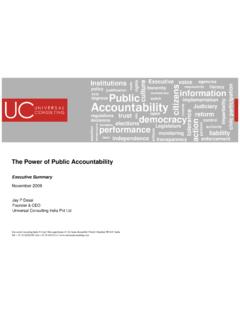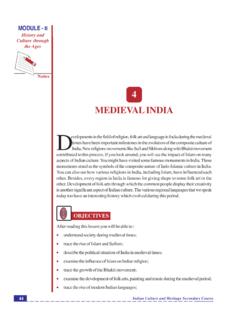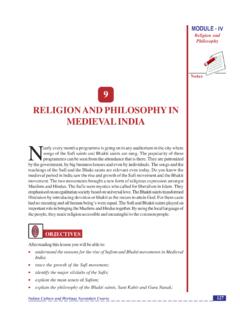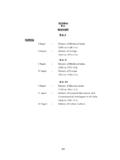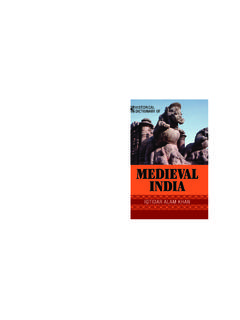Transcription of Medieval People Titles, Positions, Trades & Classes
1 Medieval People Titles, Positions, Trades & Classes Introduction: The Medieval Feudal System Life in the Medieval Castle was governed by the pyramid-shaped Feudal System. This was based on the belief that the land belonged to God - but that the Kings, who ruled by Divine Right, managed the land and used it as they wished. The Kings needed the good will and support of the Nobles and Knights so they granted them lands in return for their military services. The Nobles and Knights would in turn grant some of their lands to Freemen. Life lived under the Medieval Feudal System demanded that everyone owed allegiance to the King and their immediate superior.
2 Everyone was expected to pay for the land by providing the following services: Work days - completing any chores required Providing trained soldiers to fight for the King Providing equipment - clothes and weapons - for the soldiers Feudalism was based on the belief that the land belonged to God - but that the Kings, who ruled by Divine Right, managed the land and used it as they wished. However, under the Feudalism pyramid the King was answerable to the Pope. The Pope, as God's vicar on Earth, had the right to intervene and impose sanctions on an unjust King.
3 Under the feudalism pyramid the Pope had the power to pronounce judgment against a King, depose a King, forfeit his Kingdom, put another King in his place or excommunicate a King. The power and pronouncements of the Pope played a major part in the History of England. The Pope declared the Norman Invasion as a Holy Crusade and declared his support of William the Conqueror against the claim of King Harold. At the top of the Feudalism Pyramid was the King The King claimed ownership of the land The King granted the land to important nobles - these nobles then pledged their loyalty by swearing to serve and protect the king The king also granted land to the less powerful military men (the knights) who were called vassals The vassals also agreed to fight for the king in exchange for their land The land was worked by the peasants or serfs.
4 They belonged to the land and could not leave without permission - the bottom of the Feudalism pyramid. The pyramid of power which was the Feudal system ran to a strict 'pecking order. The order which the Medieval Feudal System was as follows: Royalty King A king ruled large areas of land/country by divine right. To protect his land from invasion, the king gave parts of it to local lords, who were called vassals. In return, his vassals promised to fight to defend the king's land. The king reported to God and then the pope (and sometimes that was negotiable).
5 Queen A female sovereign or monarch. The wife or consort of a king. Prince A non-reigning male member of a royal family. Princess A non-reigning female member of a royal family. Queen Mother A queen dowager who is mother of a reigning sovereign. The widow of a former king who is also the mother of the reigning sovereign. Regent A person who exercises the ruling power in a kingdom during the minority, absence, or disability of the sovereign. (For example: While Richard the Lionhearted was away fighting in the Crusades, his brother Prince John was left as regent.)
6 Clergy Pope (Bishop of Rome). The bishop of Rome is head of the Roman Catholic Church. In Western Church, pope applied especially to the Bishop of Rome since the time of Leo the Great (440-461) and claimed exclusively by them from 1073. The pope is believed by his church to be the successor to the Apostle Peter. He is bishop of Rome and lives in a tiny nation within Rome called the Vatican. Bishop Bishops were the leaders of the church, serving under the pope. Most bishops were noblemen. Bishops supervised the church's priests, monks and nuns and administered its business.
7 In many parts of Europe the church owned vast areas of land and commanded a large number of knights. In the early Middle Ages, it was not unusual for a bishop to lead his own knights into battle. Arch Deacon An ecclesiastic, ranking next below a bishop and having charge of the temporal and external administration of a diocese, with jurisdiction delegated from the bishop. Abbot A man who is the head or superior, usually elected, of a monastery. Prior An officer in a monastic order or religious house, sometimes next in rank below an abbot. Dean The head of the chapter of a cathedral or a collegiate church.
8 A priest in the Roman Catholic Church appointed by a bishop to take care of the affairs of a division of a diocese. Priest Priests provided spiritual instruction and conducted religious ceremonies in local, or parish, churches. Monk Monks and nuns were men and women who gave up their possessions and left ordinary life to live in monasteries and convents. They lived very simply, could not marry and devoted themselves to prayer, study, and helping the poor. They also served as doctors. Members of special male groups whose lives are devoted to the service of the church, especially in Roman Catholic, Anglican, and Orthodox denominations.
9 A MONK is properly a member of a monastery, under a superior; he is bound by a vow of stability, and is a co-owner of the community property of the monastery. Since the Reformation, MONK and FRIAR have been used as if they were the same. A FRIAR is, however, strictly speaking, a member of a mendicant order, whose members are not attached to a monastery and own no community property. Friar Friars were traveling preachers who lived by begging and spread the teachings of St. Francis of Assisi. A member of a mendicant order, whose members are not attached to a monastery and own no community property.
10 Cleric A member of the clergy. Vicar A word from the Latin "substitute" it was a clergymen paid to act in the true parish priest's stead. A vicar was often very corrupt. Barber-Surgeon A monastic who shaved faces/heads and performed light surgery. Chaplain An ecclesiastic attached to the chapel of a royal court, college, etc., or to a military unit. a person who says the prayer, invocation, etc., for an organization or at an assembly. Confessor A priest authorized to hear confessions. Scribe A person who copied books by hand before the invention of printing.
